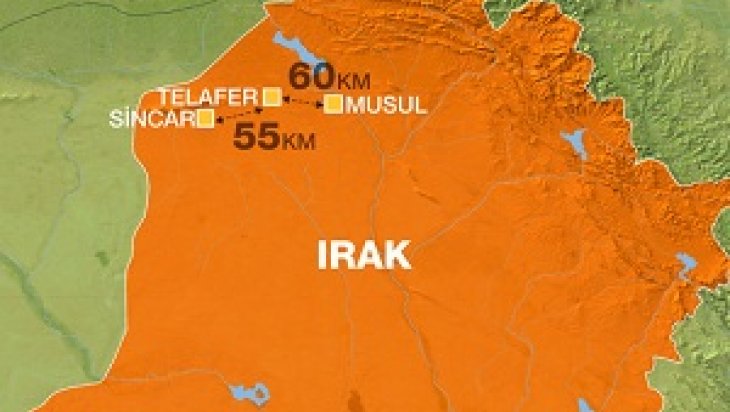Dimensions of PKK Threat in Iraq

It can be observed that PKK has been more active in the region, through the achievements of PYD (Syrian affiliate of PKK) in north of Syria, following the events that have been happening in Syria since 2011. As PKK increases its activities in Turkey, the terrorist organization has also been profiting from the advantage provided by PYD, who received international support “in the fight against ISIS”. In the process, PKK has been trying to be more active, and to create and increase its radius of action in Iraq, as well. PKK became active in the region, along the line from Sinjar in north-west of Iraq to Khanaqin in the east of Bagdad, ruled and controlled by Kurdistan Regional Government, as a result of the absence in stability, authority and power in Iraq, after ISIS took control over Mosul in June, 2014. PKK settled in Kirkuk and notably in Sinjar as well as in Tuzkhurmatu and Khanaqin, using the fight against ISIS as an excuse. PKK even announced that it declared a canton in Sinjar in January, 2015, and de facto took the control of local government in Sinjar, establishing Sinjar Regenerate Council.
Moreover, Tevgera Azadi (Kurdistan Free Society Movement), the political affiliate of PKK in Iraq, held a congress in January, 2016 under the name of 1st Kirkuk Region Conference, and determined a course of action in order to have self-governance in Kirkuk. PKK has even formed a self-governance assembly in Kirkuk, consisting of 25 people, and opened up an office in district of Dakuk in Kirkuk. Even though PKK has been this active in Iraq, the Iraqi government and its institutions have not yet been taking any steps against PKK. Instead of taking these steps, Iraqi government is providing logistical, financial and military support to Sinjar Resistance Unit (YBŞ), formed for Yazidis in Sinjar, in the leadership of PKK. YBŞ is known to have connections with Hashdi Shaabi, an entity institutionalized by the decree of Iraqi cabinet, which also includes Shiite militia groups within. Thus it is not wrong to say that Iraqi government turns a blind eye to PKK and indirectly supports it.
However, the threat of PKK has become more and more difficult to control in Iraq. Returning from G20 Summit held in China, the President of the Republic of Turkey, Recep Tayyip Erdoğan stated that PKK was trying to settle in Iraq, settled particularly in Mosul and was threatening Telafer and Turkmens. Erdoğan added that Mesud Barzani, the President of Kurdistan Regional Government, was also disturbed by this situation. Short after his statement, Erşat Salihi, the President of the Iraqi Turkmen Front and Kirkuk MP, held a press conference, and stated that PKK was threatening himself, Turkmens and Turkmen regions; and demanded PKK to be removed from Iraq. Then Westa Resul, the Commander of 4th Front Peshmerga and politburo member of Patriotic Union of Kurdistan (PUK), opposed Salihi’s statements and openly threatened him by saying that Peshmerga would know how to respond to Salihi. Resul also stated that PKK settled in the region at the request of Najmaldeen Karim, the Governor of Kirkuk. PKK, too, made a statement by the name of Mahmur-Kirkuk Command, using threatening words intended for Erşat Salihi, saying “Everybody should know their place.” Then Najmaldeen Karim, the Governor of Kirkuk, stated that he did not invite PKK to come to Kirkuk. While all these events were happening, The Iraqi government was keeping quiet.
Looking at these developments, it is obvious that the presence of PKK threatens Iraq more. It is not meaningful that the Iraqi government considers Turkish military presence in Bashiqa Camp threatening, where Turkey, as agreed, trains local forces in the fight against ISIS; but keeps quiet about the PKK activities in Iraq. PKK openly targets Iraq territories, as it has been proven in Sinjar and Kirkuk. Turkmens in Telafer and Kirkuk are also under the direct threat of PKK, through Sinjar. We saw clearly in the past, how PKK terrorists targeted Turkmen civilians in the conflict in Tuzkhurmatu. PKK’s presence in Iraq, does harm for Iraqi Kurds, as well, and causes disagreements between them. PKK acts in collaboration with Patriotic Union of Kurdistan (PUK), a party that has similar ideology and political view with PKK, led by Celal Talabani, and Goran, a party separated from PUK; while opposing Kurdistan Democratic Party (KDP). That means PUK and KDP have different stances, as well. The difference between these two parties deepens the disagreements that already existed in Kurdistan Regional Government, and increases the political conflicts.
It would not serve any purpose to develop short term and temporary policies over PKK, a terrorist organization. These organizations like PKK have no legal responsibilities and it is not the right approach to expect rational behavior from them. So the parties should take long term, permanent political steps, while acting with sensible. Considering the Mosul operation, planned to be launched in Iraq, the coordination and cooperation between Turkey and Iraq will be more important. Turkey expresses the have to protect Iraq’s integrity and political unity and clearly shows that Turkey is always on Iraq’s side in the fight against ISIS. It is obvious that Turkey will not let the formation of any entity in the region, PKK or ISIS, which would pose a threat against its national security. Ensuring stability in the region is both in the interest of the regional countries and one of the main elements of Turkish foreign policy. Therefore it is very important to clear terrorist organizations, like PKK and ISIS, from the region in order to ensure stability. PKK is not only threatening the integrity, political unity and sovereignty of Iraq, but also it has become a threat for other nations in the region. Eliminating this threat would be in the interest of all parties.











